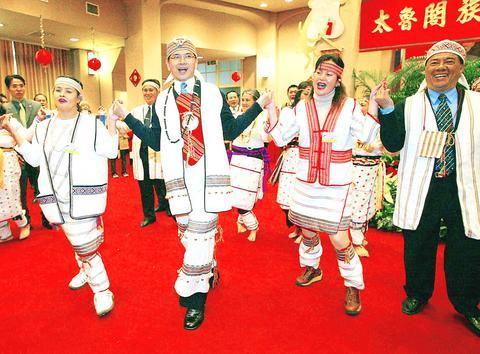The Truku (太魯閣) people of Hualien County were recognized as the nation's 12th indigenous tribe at a ceremony yesterday following a controversial, decade-long effort by activists.
Representatives of Nantou County's Sedeq people, also categorized by academics as a distinct part of the overarching Atayal (
"How can a tribe with the same culture, language and way of life be split in two? It makes no sense," said Wadann Sumigh (洼旦.蘇密), a member of the Sedeq.

PHOTO: CNA
"The government should have conducted more genealogical, demographic, cultural and linguistic research before rushing to this decision," he said.
Wadann Sumigh alleged that the Cabinet's decision was made out of political considerations.
"It's a bid to woo the 13,000 Truku that live in Hualien County. They don't really care what the 7,000 Sedeq in Nantou County think," he said.
"It's the saddest day in the history of the tribe," he said.
Wadann made the remarks during the ceremony held at the Executive Yuan yesterday morning. About 150 Truku and 60 Sedeq were in attendance.
Describing government recognition of the Truku as a milestone, Premier Yu Shyi-kun yesterday took the opportunity to lambaste a campaign promise to establish an Aboriginal autonomy zone proposed by Chinese Nationalist Party (KMT) Chairman Lien Chan (連戰).
"It's outdated and incorrect to create a single Aboriginal autonomy zone for each of the nation's 12 indigenous tribes," Yu said.
"The `ethnic assimilation' [stated in the policy] is better described as `ethnic cleansing' if the process is to be sudden and compulsory," he said.
While the KMT trumpeted the principle of ethnic assimilation, Yu said, the Democratic Progressive Party (DPP) embraced ethnic equality, harmony and pluralism.
Yu said that the DPP's Aboriginal policy was being applied from the grass roots up, rather than the other way around.
He said the DPP welcomed indigenous ambitions to establish autonomy zones, and that a bill currently before the legislature on the establishment of Aboriginal autonomous zones (原住民族自治區法) would facilitate this.
"We don't mind seeing one tribe establish three autonomous regions or three different tribes settle in one autonomous zone, as long as the decision is based on the free will of tribal people," Yu said.
"In some countries it might take decades and even considerable bloodshed to reach this point. Here in Taiwan, Aborigines don't have to go through this ordeal because of the initiative President Chen [Shui-bian (陳水扁)] took to sign an agreement with indigenous people."
Chen signed an accord with Aboriginal activists while campaigning for the presidency in 1999. In the agreement, he pledged to establish an autonomous region for Aborigines as well as formalize other rights, such as use of natural resources and land ownership.
Truku representative Lee Chih-shoon (
"It's a sacred moment, and it is for us the highest honor ... today we are proud to call ourselves Truku," Tera said.
"We'll continue to negotiate with our brothers, the Sedeq in Nantou, and work toward holding a peace ceremony with them in the near future," he said.
Truku activists started campaigning for official recognition in 1996. In June last year, Truku tribal leaders submitted a petition with 972 signatures to the Cabinet-level Council of Indigenous Peoples asking for recognition.
In July last year Truku activists petitioned Chen when he traveled to Hualien County. The DPP's Central Standing Committee, of which Chen is the chairman, later passed a resolution supporting the campaign.
In 2001 the government recognized the Thao (

An essay competition jointly organized by a local writing society and a publisher affiliated with the Chinese Communist Party (CCP) might have contravened the Act Governing Relations Between the People of the Taiwan Area and the Mainland Area (臺灣地區與大陸地區人民關係條例), the Mainland Affairs Council (MAC) said on Thursday. “In this case, the partner organization is clearly an agency under the CCP’s Fujian Provincial Committee,” MAC Deputy Minister and spokesperson Liang Wen-chieh (梁文傑) said at a news briefing in Taipei. “It also involves bringing Taiwanese students to China with all-expenses-paid arrangements to attend award ceremonies and camps,” Liang said. Those two “characteristics” are typically sufficient

A magnitude 5.9 earthquake that struck about 33km off the coast of Hualien City was the "main shock" in a series of quakes in the area, with aftershocks expected over the next three days, the Central Weather Administration (CWA) said yesterday. Prior to the magnitude 5.9 quake shaking most of Taiwan at 6:53pm yesterday, six other earthquakes stronger than a magnitude of 4, starting with a magnitude 5.5 quake at 6:09pm, occurred in the area. CWA Seismological Center Director Wu Chien-fu (吳健富) confirmed that the quakes were all part of the same series and that the magnitude 5.5 temblor was

The brilliant blue waters, thick foliage and bucolic atmosphere on this seemingly idyllic archipelago deep in the Pacific Ocean belie the key role it now plays in a titanic geopolitical struggle. Palau is again on the front line as China, and the US and its allies prepare their forces in an intensifying contest for control over the Asia-Pacific region. The democratic nation of just 17,000 people hosts US-controlled airstrips and soon-to-be-completed radar installations that the US military describes as “critical” to monitoring vast swathes of water and airspace. It is also a key piece of the second island chain, a string of

The Central Weather Administration has issued a heat alert for southeastern Taiwan, warning of temperatures as high as 36°C today, while alerting some coastal areas of strong winds later in the day. Kaohsiung’s Neimen District (內門) and Pingtung County’s Neipu Township (內埔) are under an orange heat alert, which warns of temperatures as high as 36°C for three consecutive days, the CWA said, citing southwest winds. The heat would also extend to Tainan’s Nansi (楠西) and Yujing (玉井) districts, as well as Pingtung’s Gaoshu (高樹), Yanpu (鹽埔) and Majia (瑪家) townships, it said, forecasting highs of up to 36°C in those areas